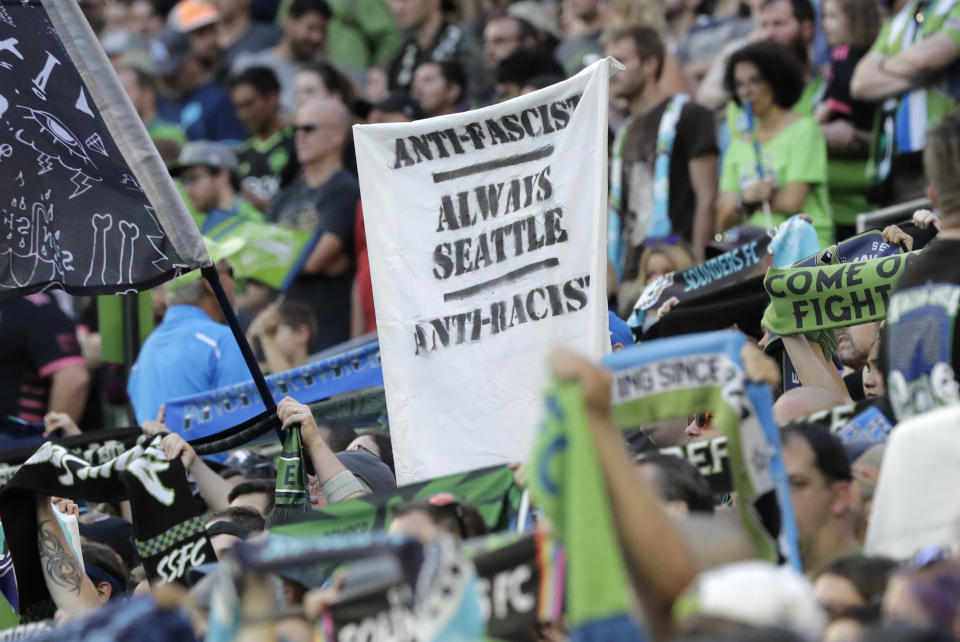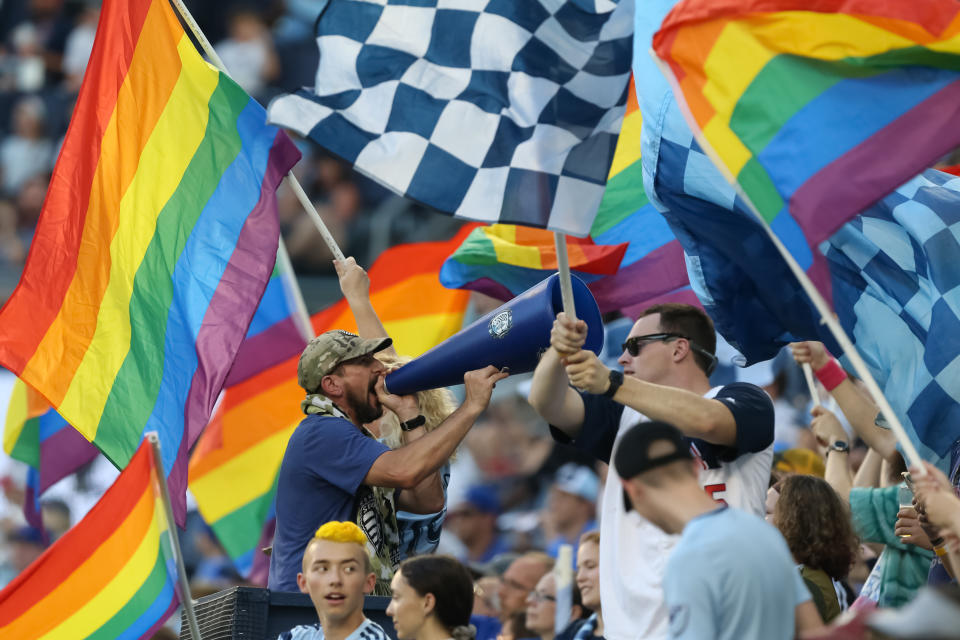Why MLS ban on political displays has fans outraged — and won't be easy to resolve

What counts as being “political” these days? What's too political for a sporting event?
Is denouncing racism or fascism political? What about waving a gay pride flag, or an American flag? How about hosting a military appreciation night? What about hanging a banner with a historical anti-Nazi symbol?
These are the questions that have fans and front offices throughout Major League Soccer butting heads since the league implemented a new policy designed to remove politics from stadiums so fans can just watch soccer. But talking to those on different sides of the debate, as Yahoo Sports has, illustrates just how difficult it is to find a clear line between politics and everything else.
The new MLS fan code of conduct, which for the first time this year prohibits any display that is "political," has been met with resistance. Fans on social media have complained about being kicked out of games for displays that in the past were allowed, while other fans have complied with the new rules but have discussed walkouts and boycotts amongst themselves.
At MLS headquarters, there has been a recognition that the new policy has inadvertently called more attention to the political displays that in years past may have gone unnoticed, and an effort to clamp down on politics may have fueled more in response. But the league thinks the growing pains of the new policy will be worth it — most fans, regardless of their political beliefs, don't want to see overtly political signs at games.
“The prohibition on political signage is in place to support the overwhelming majority of MLS fans who come to our stadiums to enjoy a great soccer game,” MLS president Mark Abbott told Yahoo Sports in a statement. “All of our fans and supporters are important to us and we will continue to engage with them to ensure that we deliver an incredible experience for all.”

Part of the appeal of attending soccer games compared to other major sports is the elaborate fan display, called “tifo,” which give games a vibrant, festive atmosphere. MLS doesn't want to dampen one of its matches’ most compelling features, and it has erred on the side of still allowing ideological messaging that has become part of the supporters culture around the league.
A sign that denounces racism, fascism or homophobia is allowed under the new guidelines — that's about human rights and the inclusiveness the MLS front office has championed, the league says. Meanwhile, a sign that endorses a political organization, candidate or policy is not allowed — that's political.
But as fans on social media report having signs confiscated and even being banned from stadiums, the backlash to the new policy doesn't seem to be going away – even if the reports on social media don’t always tell the full story.
One fan — the co-president of the Seattle Sounders’ supporters group, Emerald City Supporters — said he was ejected from a Los Angeles Galaxy game for bringing a banner that said, “Anti-Fascist | Anti-Racist | Always Seattle.” But the league disputes that his messaging was the issue — rather, supporters groups must follow rules venue-to-venue when they travel to away games, and he wasn't allowed to have a banner at all, regardless of what it said.
“Major League Soccer fully and wholeheartedly condemns racism, discrimination, fascism and any form of hatred,” Abbott said. “We and our clubs will continue to permit signs that support basic human rights, as the rainbow pride flag does, as well as those that condemn racism and fascism.”
In another incident, several Atlanta United fans said they were ejected and handed bans for signs they brought to a game at Mercedes-Benz Stadium. While the league says the sign that accused New York City FC home games of being a meeting place for Nazis was inappropriate, the fans were primarily punished for refusing to comply with security when told to remove the signs, which led to a scuffle.

The incident in Atlanta highlights the murkiness about the new code of conduct: When does a message cross over into politics? Is calling for an end to gun violence a political stance, or a human rights plea? Enforcement across the league hasn’t been consistent so far.
Atlanta United fans were asked to remove a sign that said "End gun violence," which caused a skirmish. Meanwhile, the Portland Timbers organization has explicitly said it would allow that same sign on the grounds that ending gun violence is a human rights issue. The MLS policy does not allow fans to advocate for a political organization, candidate or policy, but a call to end gun violence may not necessarily fit in those categories — not unless the message lobbies for a specific legislative approach. (Yahoo has asked MLS to clarify whether “end gun violence” signs will be allowed across the league and will update this article when the league responds.)
League-endorsed military appreciation days, where players wear shirts with army camouflage, can also feel vaguely political in a climate where everything, including the military, has been used to polarize factions and weaponize patriotism in political discourse. But MLS stands by such displays.
“We have great respect for the men and women who serve our country in the military and support our clubs honoring them and their service at MLS matches,” Abbott said.
As difficult as it is to define what is political, the tightrope becomes even more treacherous when each side isn't even using the same language in the first place.
The most contentious dispute around MLS's new policy has focused on the Three Arrows symbol, which is known as the logo of the Iron Front, an anti-Nazi paramilitary organization in 1930s Germany.
The Timbers Army, the longtime supporters group of the Portland Timbers, has been displaying the emblem since at least 2017, and they view it as merely an anti-fascist symbol. But the league argues the logo has been associated with a political group known as antifa, which has sometimes been linked to violence, and the symbol is explicitly forbidden.
“Our fan code of conduct policy, which was coordinated with our clubs, prohibits signs that promote any political organization, including the Iron Front flag, which is associated with Antifa,” Abbott said.
No matter who you support on the pitch, we can all work together to reject hate in the stands. Share pics of your Iron Front, anti-fascist match day gear today with @MLS and tag them with #AUnitedFront. Let's show them we mean business. pic.twitter.com/6JKzd82JGg
— Timbers Army (@timbersarmy) August 10, 2019
That's where a fundamental disagreement remains. The Timbers Army says “antifa” is not a movement or an organization – it is simply shorthand for being against fascism, which is a message allowed in the MLS code of conduct. But MLS says “antifa” is actually a decentralized third-party political group.
Now, a fight is brewing over a symbol that most fans probably never noticed at Timbers games. Or if they did see it, they probably didn't know what it meant. And the symbol has only seemed to spread since the ban. The Emerald City Supporters, or ECS, have been displaying it at Seattle Sounders games. Fans have also posted photos from Atlanta, Los Angeles, Minnesota, Columbus and other venues around the league displaying the symbol.
The Timbers Army, which has been arguably the most vocal fan group against the new MLS code of conduct, says anything less than allowing the Iron Front symbol at games is unacceptable.
“If you take that off the table, you have essentially given a signal to other folks that there is a little more space for them, and the safe space we created becomes less safe,” Sheba Rawson, president of the board that oversees the Timbers Army, told Yahoo Sports. “We did not have a Trump flag in the stadium until after the Iron Front flag was banned. ECS did not have white supremacists show up at their bar until a statement from the front office that the Iron Flag is banned. That’s an indication to folks.”
With each side's own lines drawn, it's difficult to see where the debate goes from here.
Timbers owner Merritt Paulson, speaking to season ticket holders Wednesday, said it was the Timbers who pushed MLS hardest to continue to allow displays opposing fascism, even if the Iron Front symbol was banned. But, he conceded, he knows for some fans it still won't be enough.
The Timbers Army say their expected response from MLS and the Timbers front office is three-fold: 1) Remove the word “political” from the code of conduct because it's too arbitrary; 2) Allow the Iron Front symbol at games again; 3) Develop a new code of conduct with input from supporters, marginalized communities and human rights activists.
If that doesn't happen? Rawson, writing for the Timbers Army blog, said collective action may become necessary.
“You want to control the message of those full, raucous stands? Fine,” she said. “We'll show you what an empty stand looks like. I’m pretty sure they won’t like what they see.”
Asked by Yahoo Sports if any such action is imminent, Rawson thought for a moment and then said simply: “We hope for the best, but we are prepared for the worst.”
Caitlin Murray is a contributor to Yahoo Sports and her book about the U.S. women’s national team, The National Team: The Inside Story of the Women Who Changed Soccer, is out now. Follow her on Twitter @caitlinmurr.
More from Yahoo Sports:

